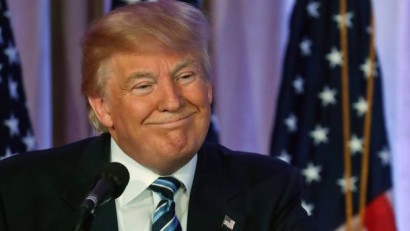Mr. Trump Comes to Washington
The eyes of Israel’s supporters – and perhaps also of Israel’s detractors – around the world are on Donald Trump this weekend as he prepares to address the American Israel Public Affairs Committee (AIPAC) Policy Conference, the largest yearly gathering of Israel-supporters in the U.S. I’m here covering the conference.
Presidential candidates Hillary Clinton, Ted Cruz, and John Kasich will also address the gathering.
This is a crowd of hard core Zionist-Americans, mostly Jewish but also some Christian Zionist, who tend to be highly educated and schooled in the history, current news, and complexities of Israel’s dealings with her neighboring Arab states, as well as in issues such as Arab anti-Israel incitement. These are citizen activists who travel from across the country on their own dime to sit and listen to lectures and panel discussions, and to personally visit and lobby their members of Congress about the latest developments and thinking regarding Israel and her security, as well as her contributions to international counter terror efforts, commerce, and science. AIPAC attendees are looking to hear something substantive.
Till now, Donald Trump’s position regarding Israel, as communicated to her American supporters, has been: “Trust me.” He speaks in generalities, and has used the word “neutral” when describing what would be his approach to overseeing negotiations between Israelis and Palestinians.
A few thoughts on this.
Of course I can understand how, in theory, anyone who wishes to oversee a negotiation would not want to betray an open prejudice from the outset. But whether intentionally or not, in using the word “neutral,” Trump has cut to the heart of the problem concerning Israeli/Arab negotiations, and the conflict itself. As Marco Rubio explained in the last debate, this is actually not a pro-Israel position. The reason it makes sense and is ethical to solidly support Israeli leadership is that, at this point in time, Palestinian leadership is by and large a terrorist leadership. That is also why the idea of a Palestinian state, however worthy in theory and perhaps down the road, would be disastrous at this historical moment.
Of course, in believing that he can muscle the situation by squeezing the more responsible party – Israel – Trump would basically be following Barack Obama’s lead, and he probably couldn’t be much worse. But even Obama was not stating at the outset (before he became President) that he would be entirely “neutral” in dealings with one of America’s strongest allies and the Palestinian leadership.
Earlier this month, a U.S. Army veteran named Taylor Force who was studying in Tel Aviv was stabbed to death by a Palestinian terrorist, and Palestinian President Mahmoud Abbas – whose PA receives millions of dollars in U.S. aid every year – was reluctant to condemn the murder. Those who follow the incitement to violence that takes place in the Palestinian territories – on TV, in newspapers, in U.S. and E.U.- funded schools – were not really surprised. After all, it is an open secret that Mr. Abbas and other Palestinian “leaders” either actively encourage or look the other way in the face of a system of indoctrination to hatred – of Israelis, first, but also of all Jews, Christians, and Americans – that begins in early childhood in the Palestinian territories and is partly subsidized by misguided folks around the world, including the UN and the U.S. taxpayer.
What Mr. Trump and any candidate should be asked is not only how he can be “neutral” between the murderers of not just Israelis but also Americans, and Americans’ allies the Israelis, but how, were he to become President, he would begin to address the biggest real causes of the so-called Israeli/Palestinian conflict: hatred and desire to destroy Israel that begins with indoctrination in early childhood.
Not only did Abbas fail to promptly condemn the stabbing of Taylor Force. Fatah, his political organization, celebrated it.
Americans don’t really need a better illustration than that as to who their allies are in the Mideast. The American people know who loves them and who doesn’t, which people by and large share their values – and which don’t. Unless and until real reforms take place on the Palestinian side, an American President can’t be “neutral” in this conflict. And any so called “peace process” that does not identify and empower any genuine Palestinian moderates or reformers – and stop feeding a corrupt and bloodthirsty Palestinian “leadership” – cannot succeed.
It will be interesting to see if Trump takes questions at the conference and if anyone asks him anything substantive about so-called “settlements,” indoctrination, or the murder, by Palestinian terrorists, of Taylor Force and many other Americans who happened to be in Israel through the decades.
My guess is Trump will not take questions.
Hope I’m wrong. I really would like to hear what he thinks. And the entire pro-Israel community will be listening very carefully. Though it is standard practice at AIPAC for any politician to tout his or her pro-Israel bona fides and to be reassuring, again, he will have to really say something substantive to impress this crowd. Platitudes, and “I have a Jewish daughter” – while very nice – means nothing in terms of policy. And after eight years of Barack Obama and a nuclear “deal” that has left Israelis vulnerable to their worst enemy, the pro-Israel community will want to hear more than, “Trust me.”
This entry was written by Heather Robinson and posted on March 20, 2016 at 1:34 am and filed under Blog. permalink. Follow any comments here with the RSS feed for this post. Keywords: AIPAC, Donald Trump, Hillary Clinton, John Kasich, Taylor Force, Ted Cruz. Post a comment or leave a trackback: Trackback URL. */?>




